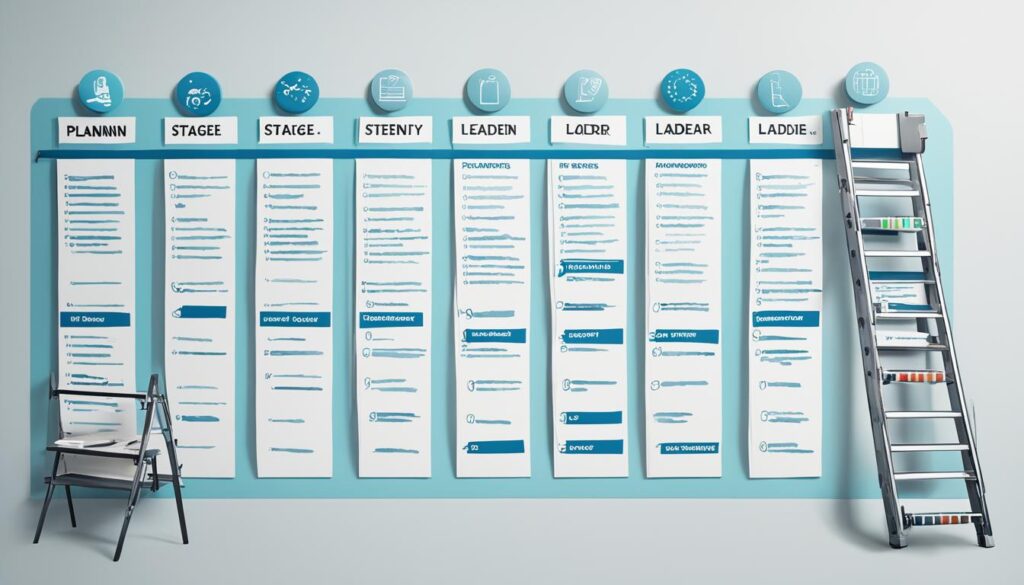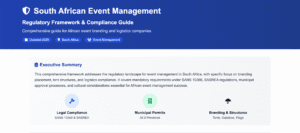Orchestrating an event in South Africa? Each step of the way, from the initial spark of an idea to the final cheers of success, involves a series of well-defined event planning stages. Navigating through these stages with care and detail is pivotal to the creation of a seamless event. Understanding the event planning process, complete with an event planning checklist, ensures that every facet of the occasion, from the initial ideation to the post-event wrap-up, contributes to a larger, coordinated effect. In South Africa, where events can vary from local community gatherings to international conferences, mastery of event coordination stages, event management stages, and event organization steps, is not just recommended – it’s essential.
Embarking on this journey requires a meticulous approach: initiating with a bold vision, transiting through diligent planning and budgeting, and culminating in the smooth execution and review of the event. This process is as diverse and dynamic as the South African landscape itself, encompassing the need for both rigid structure and creative flexibility. Let’s dive into the intricate dance of these stages to discover the rhythm of successful event planning in one of the world’s most vibrant event destinations.
Key Takeaways
- Identify the comprehensive stages of the event planning cycle.
- Understand the significance of a detailed event planning checklist in South Africa.
- Discover how to effectively manage each phase of the planning process for successful outcomes.
- Recognize the importance of both creative ideation and practical logistics in planning events.
- Learn the art of event coordination through structured yet adaptable strategies.
- Glean insights on executing and evaluating events to refine and enhance future experiences.
Understanding the Foundations of Event Planning
In the dynamic landscape of South African event management, laying the groundwork for your event is a multi-faceted process. It begins with vividly visualising your event, involves constructing a detailed planning framework, and necessitates the formulation of clear goals and objectives. As we delve deeper into these aspects, it becomes clear how each contributes fundamentally to the focused event planning required for success.
Visualising Your Dream Event
The creative process of visualising the event sets the wheels in motion for transforming an idea into an experience. It goes beyond imagining the decor or attendees; it’s about constructing the sensory and logistical map of the event that aligns with your vision. At this stage, every decision ties back to the overall event goals and objectives, from selecting the perfect venue to the intricacies of attendee engagement.
Drafting a Robust Event Blueprint
Once the vision is crystallised, the next stage is about laying down the tactical blueprint. Every aspect of event planning converges into this blueprint, encompassing an event budget, a precise event timeline, and the allocation of responsibilities to delegate tasks effectively. Ensuring that these aspects are meticulously addressed paves the way for seamless event management.
Significance of Defining Event Goals and Objectives
Defining event goals and objectives is the compass by which successful event planning navigates. This critical process ensures that every stage of planning is moving in a direction that is not just aligned with the overarching vision but is also measurable and results-focused. It’s about knowing the impact you wish to create and understanding how to measure event success accurately post-event.
To illustrate the contrasts and interplay between these foundational elements, consider the following table which captures the essence of focused and strategic planning.
| Planning Stage | Key Focus | Outcome |
|---|---|---|
| Visualisation | Event concept and immersive experience | A clear and compelling vision for the event |
| Blueprint Development | Budget, timeline, and task delegation | An actionable plan with defined deadlines and responsibilities |
| Goals & Objectives | Strategic purpose and targets | Clear criteria for measuring the event’s impact and success |
In conclusion, event planning stages serve not just as isolated steps but as a cohesive journey. From visualising the event to discerning the details and setting tangible targets, each phase is interconnected and intrinsic to producing memorable and effectively managed events. Thus, the art and science of event planning are both encapsulated in the ability to predict, plan, execute, and reflect — a cycle that ensures constant improvement in the pursuit of event excellence.
What Are the 7 Stages of Event Planning?
Successfully navigating through South Africa’s event planning scene requires understanding the intricate 7 stages of event planning. These stages serve as a strategic foundation for crafting memorable celebrations and gatherings. From conceptual design to post-event analysis, they ensure event planners have a comprehensive roadmap.

- Defining Event Goals and Objectives: The starting point of any event arrangement is to crystallize its purpose and desired outcomes. These targets guide the entire planning process, influencing decisions and strategies.
- Event Type and Venue Selection: Identifying the type of event and the ideal venue sets the stage for event logistics planning. This is where the charm and functionality of an event start to take shape.
- Financial Management with Budgeting: Establishing a budget is crucial for financial oversight. A detailed budget ensures that funds are appropriately allocated and expenses kept under control.
- Marketing and Promotion: Crafting and implementing event marketing strategies are vital in drumming up interest and ensuring high attendance rates, significantly impacting the event’s success.
- Logistics and Operations Organization: Solidifying an event logistics plan is paramount, encompassing transportation, catering, and on-site coordination.
- Event Implementation: This stage involves the physical realization of all the plans, a true test of prior preparation, and real-time problem-solving skills.
- Post-Event Evaluation: Event evaluation is integral in assessing the efficacy of the event against initial goals, learning from experiences, and informing future event strategies.
An effective event planning checklist addresses these stages in detail, translating them into actionable items. In the spirit of this iterative and dynamic process, event planners are encouraged to refine their tactics with each event, contributing to an uptrend in quality and a richer attendee experience.
Conclusion
The artistry of event planning in South Africa revolves around the mastery of its 7 critical stages, a cornerstone for successful events. With a clear grasp on this structured approach, starting from the conceptual visualization to the reflective evaluation post-event, event creators are well-equipped to construct occasions that stand out in memory and experience. It’s an intricate dance where each step—in visualization, budgeting, scheduling, and more—flows into the next, creating a seamless choreography of logistics and creativity.
By emphasizing event management planning skills, professionals can deliver not just an event but a memorable event experience that resonates with both the client’s vision and the attendees’ expectation. These skills are nurtured through a strategic alignment of resources, objectives, and innovative thinking that consider all facets of the occasion—from the macro vision down to the minutiae of guest comfort. It’s this deep understanding that allows for a rich tapestry of events that captivate and define moments worth recalling.
Ultimately, the ambition for any event planner is to adopt a strategic event approach that delivers excellence and leaves a lasting imprint on the landscape of South African events. The 7 stages of event planning are not merely a checklist to be ticked off but a philosophy of event creation, where detail and passion coalesce to yield experiences that echo beyond the confines of venues. For the event planner willing to embrace these principles, the reward is the consistent delivery of events that are not just successful but extraordinary.
FAQ
What are the initial steps in visualizing an event?
The initial steps include conceptualizing the event’s name, date, venue, attendee count, type of entertainment, and publicity needs. This phase sets the foundation for what the event will look and feel like.
How is a robust event blueprint created?
A robust event blueprint includes formulating a detailed budget that covers all potential costs, negotiating with vendors, and creating a timeline that outlines key milestones and deadlines for tasks, facilitating effective coordination and resource management.
Why is defining event goals and objectives important?
Defining event goals and objectives provides clear direction and purpose for the event. Goals set the broad vision, while objectives are measurable and specific, helping to guide the planning process and measure the event’s success after completion.
What are the 7 stages of event planning?
The 7 stages of event planning include: 1) Goal definition and event conceptualization, 2) Budgeting and financial planning, 3) Scheduling and timeline management, 4) Venue selection and vendor negotiation, 5) Marketing and promotion, 6) Logistics and on-site coordination, and 7) Post-event evaluation and analysis.
How important is budgeting in the event planning process?
Budgeting is crucial as it outlines the financial framework of the event. It ensures that all aspects of the event are financially feasible and helps prevent overspending. It also aids in prioritizing resources to different areas of the event.
What strategies can be employed in event marketing?
Effective event marketing strategies may include digital marketing, social media campaigns, email marketing, public relations initiatives, partnerships, and influencer outreach to increase event visibility and engagement.
How does one ensure the event implementation goes smoothly?
To ensure smooth event implementation, an event planner should oversee and confirm all details, adhere to the schedule, coordinate with team members and vendors, and prepare for unexpected challenges with contingency plans.
What is involved in the event evaluation stage?
The event evaluation stage involves analyzing feedback from attendees, reviewing financial statements, assessing the achievement of goals and objectives, and identifying areas for improvement for future events. This reflection is key in refining event management skills.
Can you explain the importance of the event timeline?
The event timeline is essential as it serves as a road map for the planning process, ensuring that tasks are completed in sequence and on time. It aids in delegation, keeps the team on the same page, and helps track progress towards the final execution of the event.
What steps are necessary for successful event logistics planning?
Successful event logistics planning involves arranging transport, securing accommodations, managing suppliers, and creating a seamless flow of activities. It focuses on the operational aspects of the event to ensure a positive attendee experience.




